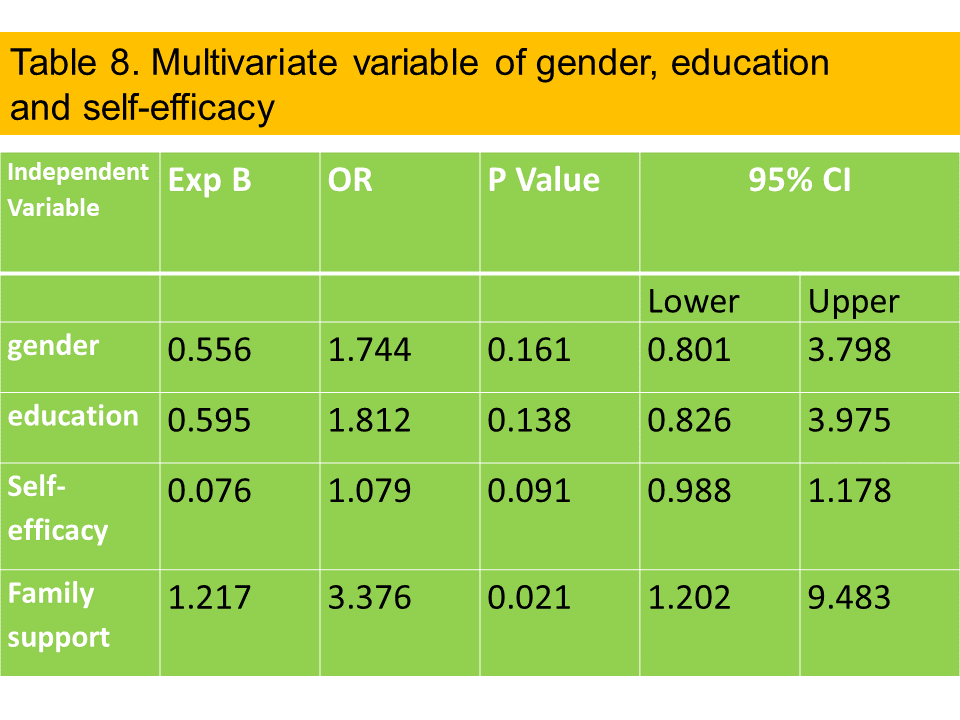The Relationship of Self Efficacy and Family Support with Self Care in Elderly Age Diabetes Mellitus Type II
DOI:
https://doi.org/10.23917/bik.v16i1.1161Keywords:
Diabetes Mellitus Type II, Self efficacy, Family support, Elderly, Self-careAbstract
Family support is an element that is very closely related to the elderly. Increased self-efficacy will control symptoms, treatment and lifestyle so that patients are able to adapt to their conditions. This study will analyze the relationship between self-efficacy and family support with self-care in the elderly with type II diabetes mellitus at the Cipondoh Public Health Center, Tangerang City. Methods: This research design is a quantitative research with a cross sectional approach. Sampling using purposive sampling with a total of 167 respondents. Collecting data using self efficacy questionnaire for diabetes scale, HDFSS and DSMQ. Results: bivariate analysis using the chi square test stated that there was a relationship between self-efficacy and self-care for type II DM patients, namely (p = 0.016) OR 2. 474 means that self-efficacy has a chance of 2,474 times good self-care. There is a relationship between family support for self-care (p = 0.004) with an OR value of 4.033 which means that family support has a good chance of 4.033 times having good self-care. Multivariate analysis showed that the variable most related to self care was family support with OR = 3.682. It is hoped that health workers at the Cipondoh Health Center in Tangerang City will improve health promotion through PTM posbindu activities, both in the form of education about self-efficacy and family support, which can be done by involving the family. Multivariate analysis showed that the variable most related to self care was family support with OR = 3.682. It is hoped that health workers at the Cipondoh Health Center in Tangerang City will improve health promotion through PTM posbindu activities, both in the form of education about self-efficacy and family support, which can be done by involving the family. Multivariate analysis showed that the variable most related to self care was family support with OR = 3.682. It is hoped that health workers at the Cipondoh Health Center in Tangerang City will improve health promotion through PTM posbindu activities, both in the form of education about self-efficacy and family support, which can be done by involving the family.
References
Adinata, Ach. Arfan, Minarti Minarti, and Kastubi Kastubi. 2022. Relationship of Self-Efficacy, Compliance and Family Support with Self-Management of Type 2 Diabetes Mellitus Patients in Surabaya (Hubungan Efikasi Diri, Kepatuhan Dan Dukungan Keluarga Dengan Manajemen Diri Penderita Diabetes Mellitus Tipe 2 Di Surabaya) Jurnal Ilmiah Keperawatan Stikes Hang Tuah Surbaya 17(1):6–15. doi: 10.30643/jiksht.v17i1.160.
Ariani, Yesi, Ratna Sitorus, and Dewi Gayatri. 2012. Motivation and Self-Efficacy of Type 2 Diabetes Mellitus Patients in Nursing Care (Motivasi Dan Efikasi Diri Pasien Diabetes Melitus Tipe 2 Dalam Asuhan Keperawatan). Jurnal Keperawatan Indonesia 15(1):29–38. doi: 10.7454/jki.v15i1.44.
Chaidir, R., Wahyuni, Furkhan, . W. 2017. Relationship between Self Care and Quality of Life in Diabetes Mellitus Patients (Hubungan Self Care Dengan Kualitas Hidup Pasien Diabetes Melitus). https://doi.org/10.22216/jen.v2i2.1357
Chaidir, Reny, Ade Sry Wahyuni, and Deni Wahyu Furkhani. 2017. Relationship of Self Care with the Quality of Life of Diabetes Mellitus Patients (Hubungan Self Care Dengan Kualitas Hidup Pasien Diabetes Melitus). Jurnal Endurance 2(2):132. doi: 10.22216/jen.v2i2.1357.
Dharma, K. 2015. Nursing Research Methodology (Metodologi Penelitian Keperawatan). Jakarta timur: CV. Trans Info Media.
Hanifah, Rifa Asmah, Program Studi, Ilmu Keperawatan, and Fakultas Ilmu Kesehatan. 2019. Relationship between Family Support and Self-Efficacy with Type-2 Diabetes Mellitus Self-Care at the Community Health Center. Relationship between Family Support and Self-Efficacy with Type-2 Diabetes Mellitus Self-Care at the Health Center (Hubungan Dukungan Keluarga Dan Efikasi Diri Dengan Self-Care Penderita Diabetes Mellitus Tipe-2 Di Puskesmas Hubungan Dukungan Keluarga Dan Efikasi Diri Dengan Self-Care Penderita Diabetes Mellitus Tipe-2 Di Puskesmas).
Irwan S K M. 2014. About the Author (Tentang Penulis). Wacana, Journal of the Humanities of Indonesia 1(2):1–88.
Isnaini, Nur, and Ratnasari Ratnasari. 2018. Risk Factors Influencing the Occurrence of Type Two Diabetes Mellitus (Faktor Risiko Mempengaruhi Kejadian Diabetes Mellitus Tipe Dua). Jurnal Kebidanan Dan Keperawatan Aisyiyah 14(1):59–68. doi: 10.31101/jkk.550.
Istiyani. 2018. Relationship of Family Support with Self Care Behavior of Type 2 Diabetes Mellitus (Hubungan Dukungan Keluarga Dengan Self Care Behavior Penderita Diabetes Millitus Tipe 2). Skripsi 2(dm):1–76. https://doi.org/10.36984/jkm.v1i1.4
Kemenkes RI. 2019. “Hari Diabetes Sedunia Tahun 2018.” Pusat Data Dan Informasi Kementrian Kesehatan RI 1–8.
Luthfa, Iskim. 2016. Family Support in Patients of Type 2 Diabetes Mellitus Bangetayu Health Center in Semarang, Rasch Model Analysis (Dukungan Keluarga Pada Pasien Diabetes Melitus Tipe 2 Puskesmas Bangetayu Semarang, Analisis Model Rasch). Nurscope?: Jurnal Penelitian Dan Pemikiran Ilmiah Keperawatan 2(1):12. doi: 10.30659/nurscope.2.1.12-23.
Marlinda, Ni Wayan Yatik, I. Kadek Nuryanto, and Ni Ketut Noriani. 2019. "Relationship of Family Support with Self-Care Activity in Patients with Type 2 Diabetes Mellitus (Hubungan Dukungan Keluarga Dengan Perawatan Diri (Self Care Activity) Pada Pasien Diabetes Melitus Tipe 2). Jurnal Riset Kesehatan Nasional 3(2):82. doi: 10.37294/jrkn.v3i2.182.
Potter & Perry. 2009. Fundamentals of Nursing (Fundamental Keperawatan). ke 7. jakarta: Salemba Medika.
Prasetyo, A. 2019. Management of Diabetes Mellitus in Geriatric Patients (Tatalaksana Diabetes Melitus Pada Pasien Geriatri). Cddk-277 46(6):420–22.
Rahman, H. F., Yulia, and Lestari Sukarmini. 2017. Self-Efficacy, Adherence, And Quality Of Life Of Patients With Type 2 Diabetes Mellitus (Self Efficacy, Adherence, And Quality Of Life Of Patients With Type 2 Diabetes (Efikasi Diri, Kepatuhan, Dan Kualitas Hidup Pasien Diabetes Melitus Tipe 2 ( Self Efficacy, Adherence, And Quality Of Life Of Patients With Type 2 Diabetes ). E-Jurnal Pustaka Kesehatan 5:108–13.
Ramadhani, D., F. MM, and R. Hadi. 2016. Characteristics, Family Support for the Prevention of Type 2 Diabetes Mellitus in Padangsari Village, Semarang (Karakteristik, Dukungan Keluarga Terhadap Pencegahan Diabetes Mellitus Tipe 2 Di Kelurahan Padangsari, Semarang). Jurnal Ners Lentera 4(2):142–51.
Rias, Y. A. 2016. Relationship of Knowledge and Beliefs with Self-Efficacy of Persons with Diabetic Foot Ulce (Hubungan Pengetahuan Dan Keyakinan Dengan Efikasi Diri Penyandang Diabetic Foot Ulce). Jurnal Keperawatan Muhammadiyah.
Soelistijo, Soebagijo, Hermina Novida, Achmad Rudijanto, Pradana Soewondo, Ketut Suastika, Asman Manaf, Harsinen Sanusi, Dharma Lindarto, Alwi Shahab, Bowo Pramono, Yuanita Langi, Dyah Purnamasari, and Nanny Soetedjo. 2015. Consensus on Management and Prevention of Type 2 Diabetes Mellitus in Indonesia 2015 (Konsesus Pengelolaan Dan Pencegahan Diabetes Melitus Tipe2 Di Indonesia 2015).
Tabasi, H. K., Madarshahian, F., Nikoo, M. K., et al. 2014. Impact of Family Support Improvement Behaviors on Anti Diabetic Medication Adherence and Cognition in Type 2 Diabetic Patients (Dampak Peningkatan Dukungan Keluarga Perilaku terhadap Kepatuhan dan Kognisi Pengobatan Anti Diabetes pada Penderita Diabetes Tipe 2).Journal of Diabetes and Metabolic Disorders 13. https://doi.org/10.1186/s40200-014-0113-2
World Health Organization. 2016. “Global Report on Diabetes.” Isbn 978:88. doi: ISBN 978 92 4 156525 7.
Yaqin, A., Niken, S., & Dharmana, E. 2017. Effects of Self Efficacy Training on Self Efficacy and Compliance with a Diabetic Diet. (Efek Self Efficacy Training Terhadap Self Efficacy Dan Kepatuhan Diet Diabetesi). Jurnal Ilmu Kesehatan 1. https://doi.org/10.33006/ji-kes.v1i1.45

Downloads
Submitted
Accepted
Published
How to Cite
Issue
Section
License
Copyright (c) 2023 imas sartika

This work is licensed under a Creative Commons Attribution 4.0 International License.


















